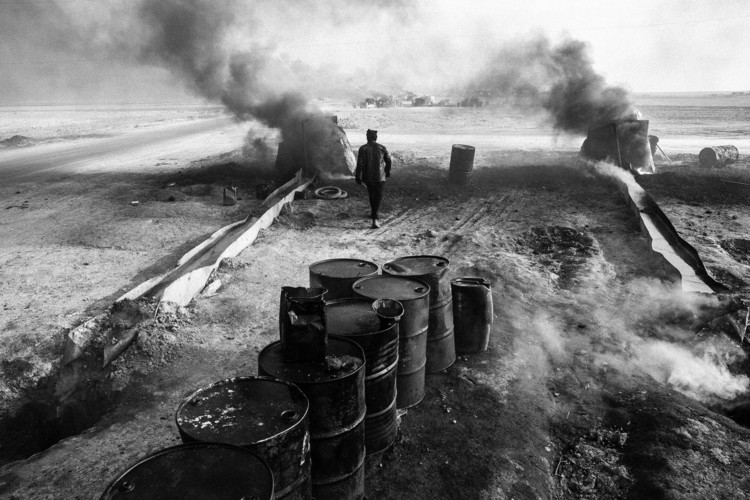As we enter the holiday season and the end of 2015, those of us at The Affiliate Network will be taking some time off to spend with family and friends and prepare for the year ahead. The Affiliate Network will return in January with more of the posts you’ve come to expect as we continue working towards our goal to inform our readers, foster debate about the substance of global issues, and promote the expertise of our Affiliates. However, to keep you tied over until then, we’re publishing this recap of 2015.
2015 Through Affiliate Network Posts
What better way to prepare for the year ahead, than to look back on some of the events that shaped the world through the eyes of our Affiliates.
2015 was a year of political transition in many places across the Globe. Where change was in the air, Affiliates were there to share insight and develop understanding of the actions shaping the outcomes. In the lead up to the recent elections in Argentina, Jared Wilhelm described the efforts of Christina Kirchner’s party to shape the political environment in Some More Equal than Others. Meanwhile, Pedro Calmon presented an in-depth look at the underlying problems facing Brazilians in The Current Brazilian Crisis Explained.
This year also saw cracks forming in the regimes of long-standing ruling powers. Lino Miani exposed the decision facing Malaysians in Malaysia on the Brink, while Megan Hallinan’s Intervention Tension: Burundi’s Moment of Truth laid out an argument for western intervention in Burundi where Pierre Nkurunziza’s unconstitutional third-term is leading to increasing unrest.
Unfortunately, a reoccurring theme throughout the year was the continued presence of radical islamic extremism, and a reflection on the major events of 2015 would be remiss if it failed to address its global impact. Navisio Global CEO, Lino Miani, examined the origins of the Islamic State in The Root of all ISIL, while Wolfgang Pusztai addressed the issues facilitating the spread of ISIL to formerly secure areas in Tunisia – Fertile Ground for Terrorism?
The ongoing instability in Africa and the Middle East created a monumental crisis for the European Union as the number of people seeking refuge within its boundaries overwhelmed both the administrative and physical capabilities to process and provide for these people. In Flashpoint Europe: The Refugee Crisis and the Fate of the Union, Nick Avila discussed the political strains the refugee crisis is causing among the members of the European Union.
While much of the focus of the crisis has been centered on its causes and the tensions resulting from the massive influx of people, it isn’t all bad news. Michael Anderson argued that Serbia’s actions during the crisis have repaired perceptions and created possibilities for future pro-western connections in What About Serbia?
Finally, Affiliate expertise was not confined to geographic terrain. Throughout 2015, Affiliates continued to engage the rapidly developing cyber community. Anticipating a continued escalation in Cyber Warfare, Dr. Brian Mazanec presented a case that historical norms that restrict the use of chemical and biological weapons will have a limited impact in future wars in Bad News: Cyber Norms Probably Won’t Constrain Cyber Conflict.
Looking Forward to 2016
Given the fact that many of the issues reported on in 2015 remain unresolved, 2016 promises to be equally eventful. In Asia, China’s expansionist policies in the South China sea are walking a narrow tight rope that threatens peace and a vital artery of international commerce. From the Middle East to Africa and Europe, diplomats and generals from a multitude of nations have their hands full as the evolving nature of the Syrian civil war becomes increasing complex and friction regarding objectives and means threatens to reignite Great Power conflicts.
Amidst all the conflict there is hope. New governments in countries like Argentina have the opportunity to convert momentum for change into social progress, while in Columbia the government may finally achieve a peace deal with the FARC and the long-desired end to that conflict.
Wherever the new year leads, The Affiliate Network promises to work hard to continue to inform and deliver insights from those most knowledgable of the events that shape our world.
Launching The Affiliate Network
As we wrap up this post it should be mentioned that this week marks the first anniversary of the launch of The Affiliate Network. Starting with little more than a desire to create a forum where those with the best perspective on the events shaping our world could share it broadly, The Affiliate Network has experienced tremendous growth!
In our first year, the website has been viewed over 5000 times from users across the globe. In our efforts to inform the global audience, we have reached readers in 101 nations, spanning all corners and every continent. Our largest viewership comes from the United States, Belgium, Germany and the United Kingdom, but we have also established a large readership in Southeast Asia, Northern Africa and Eastern Europe.
For those who have helped make this website a success by sharing our posts on social media, recommending the site to friends and colleagues, and contributing articles, “thank you” doesn’t describe how much we truly appreciate your continued involvement. We send our sincerest wishes for a happy holidays and the best of new years.
Do you have something to say or want to write for The Affiliate Network? See the Guide for Submissions page and contact us to get started.
![]() Jim Armstrong is the Blog Master for The Affiliate Network. The views expressed here are his own and do not represent the official position of any organization of the Government of the United States.
Jim Armstrong is the Blog Master for The Affiliate Network. The views expressed here are his own and do not represent the official position of any organization of the Government of the United States.




 eason we keep hearing tales of the group’s fabulous riches. Since
eason we keep hearing tales of the group’s fabulous riches. Since